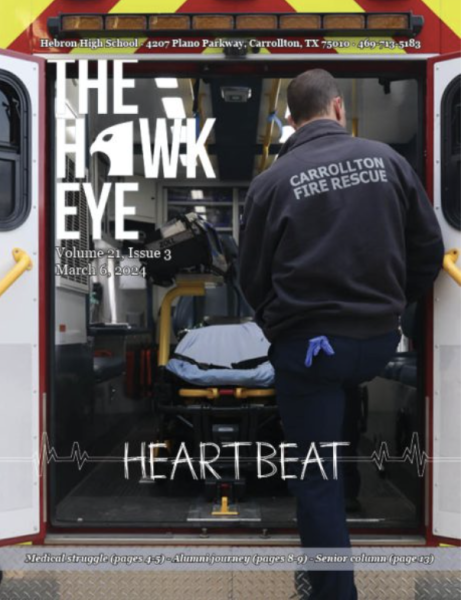District finalizes new graduation plans under House Bill 5
March 26, 2014
[vc_row][vc_column width=”1/1″][vc_column_text]The school board has adopted revised graduation plans proposed by the state under House Bill 5 (HB 5). These plans will take effect next school year and mainly affect incoming freshmen, but current freshmen will have the option to change their existing plan.
The graduation plans will no longer require speech and English IV as credits. Students will also have the choice of taking World Geography or World History, but both will not be required.
According to counselor Tracey Shinkle, the biggest change in the plans is that the basic four credits for each subject are no longer required. Algebra II may also not be required and the district is still deciding potential English alternatives.
The new graduation plans will be called “graduating with endorsements,” and each plan will be an endorsement, or a pathway where students will be required to take certain classes. Core classes will stay the same, but many elective classes may not be available for some students.
“The plus side is, they [students] are picking their pathway and know exactly which classes they are going to take every year,” Shinkle said. “But the downside is that, classes they decide to take as an eighth or ninth grader, by the time they’re in eleventh or twelfth grade, may change depending on their new interests.”
According to Shinkle, the benefit of the new graduation plans is that students will have more flexibility regarding the direction they want to take their high school career; however, one of the consequences is that the new plans may give students an easy way to graduate. Also, the state’s lack of detail has forced school districts to use their own interpretation and make necessary adoptions.
“I’m not pleased that the state has just thrown [the plans] out there,” Shinkle said. “It hurts [the school’s] staffing with classes being removed, and especially hurts the students as some plans take away rigorous classes which help for college.”
With the removal of speech as a requirement, speech teacher David Cone believes students are now less likely to take his class.
“I feel like [the class] is beneficial because it reinforces skills for those who don’t have them and it builds those skills up,” Cone said. “For example, we do job interview skills, people skills, which some of our students are lacking. I’m disappointed [that it’s no longer required] because [the class] does serve a purpose, especially because I teach as practically as possible.”
The district’s argument, according to Cone, is that students will have more flexibility to take classes they are more interested in.
“Flexibility is great, but my argument is flexibility at what cost?” Cone said. “The students who need this class the most are the least likely to sign up for it. They’re going to miss out on opportunities that, in a safe environment, you won’t get the same opportunity in other places.”
The plans are set up to give varying options for classes and it will be up to the students to decide what pathway they will take.
“I would take the opportunity to be able to change my schedule if it better fits my career path, but, I want to be able to take all the classes I need to be successful in college,” freshman Rubab Ali said. “I don’t think I want to spend the rest of high school just taking the easy way out; I want to challenge myself to see the world better.”
Another change for next year, unrelated to HB 5, is a change in the Physics classes. The regular and Pre-AP classes will be grouped as Physics 1. AP Physics B will be renamed to Physics 2, while Physics C will remain unchanged. As of now, Physics 2 will only be offered in the spring semester. Science teacher Christine Cone encourages students to take both classes consecutively.
“The classes are supposed to be set up so that we can go deeper into the material and that colleges are most likely to accept the credit,” Cone said. “The consequences may be that the classes may not fit some students very well and could really use that Pre-AP class.”
The plans are bringing about something different than what most everyone is familiar with. However, according to Shinkle, they may prove to be effective, especially for students struggling to decide for their future.
“It’s a learning experience for everybody, especially for the counselors, because we take our job seriously in trying to make sure students take the correct class and head toward graduation,” Shinkle said. “I think the students are just going to have to make sure that the classes they’re going to take in high school benefit them, especially if they’re a college-bound student.”[/vc_column_text][/vc_column][/vc_row]







Catherine Leigh • Apr 2, 2014 at 9:11 PM
I personally share some of the concerns expressed by Ms.Shinkle: asking students to decide on a path for their high school education in their freshman year has the potential to not only overwhelm undecided students, but also to prevent the growth of individual students that may choose not to expand their horizons due to their reservations or fear of failing a certain class. I feel that the new plan encourages students to find their comfort zone and stay within the boundaries that they deem suitable to their intellect, when they truly have the potential to thrive in more difficult and/or diverse classes.
Though the motives behind the new changes are positive and seek only to benefit students, until the new plan proves itself beneficial to students as they progress from high school to college and into the workforce, I can only shake my head in puzzled confusion at the notion that 14 year olds could be charged with effectively planning their own education with a career in mind.